
DIGESTIVE DISEASES
Scope & Guideline
Uncovering Breakthroughs in Gastroenterology.
Introduction
Aims and Scopes
- Gastrointestinal Diseases and Disorders:
The journal covers a wide array of gastrointestinal diseases, including but not limited to inflammatory bowel disease (IBD), liver diseases, and gastric disorders, providing insights into their pathophysiology, diagnosis, and treatment. - Innovative Diagnostic and Therapeutic Approaches:
Research on novel diagnostic techniques (e.g., endoscopy, imaging) and therapeutic strategies (e.g., biologics, pharmacotherapy) is a central theme, emphasizing advancements that improve patient outcomes. - Impact of Microbiota and Genetics:
The role of gut microbiota and genetic factors in gastrointestinal diseases is explored, highlighting their implications for personalized medicine and targeted therapies. - Epidemiology and Public Health:
The journal addresses epidemiological studies and public health issues related to digestive diseases, including prevalence, risk factors, and the impact of lifestyle and diet. - Multidisciplinary Approaches:
Encouraging collaboration among gastroenterologists, pathologists, surgeons, and other specialists, the journal promotes a multidisciplinary approach to understanding and treating gastrointestinal conditions.
Trending and Emerging
- Precision Medicine in Gastroenterology:
An increasing number of studies are focusing on personalized approaches to treatment, particularly in IBD and liver diseases, highlighting the importance of genetic and microbiota influences on treatment outcomes. - Artificial Intelligence and Technology in Endoscopy:
Emerging research on the application of artificial intelligence in enhancing diagnostic accuracy and treatment efficacy in endoscopic procedures is gaining traction, reflecting technological advancements in the field. - Gut-Brain Axis and Mental Health:
There is a growing recognition of the relationship between gastrointestinal health and mental health, particularly in conditions like IBS and IBD, indicating an interdisciplinary approach that encompasses both physical and psychological aspects. - Chronic Disease Management and Telehealth:
The COVID-19 pandemic has accelerated interest in telehealth and remote monitoring strategies for chronic gastrointestinal diseases, emphasizing the need for effective management in a post-pandemic world. - Nutritional Interventions and Gut Health:
Research exploring the role of diet and nutrition in managing gastrointestinal diseases is on the rise, particularly with respect to the Mediterranean diet and its impact on conditions like IBD and liver diseases.
Declining or Waning
- Traditional Surgical Techniques:
There seems to be a decrease in papers focusing solely on conventional surgical methods for gastrointestinal conditions, possibly due to the rise of less invasive and more effective endoscopic and minimally invasive techniques. - Generalist Approaches to Gastrointestinal Diseases:
Research that takes a more generalist view of gastrointestinal diseases without specific focus on emerging technologies or targeted therapies is less frequently represented, reflecting a trend towards specialization. - Pharmacotherapy for Non-Cirrhotic Liver Diseases:
The focus on pharmacotherapy for non-cirrhotic liver diseases appears to be waning, potentially due to a shift towards more integrated approaches that include lifestyle and dietary modifications alongside pharmacological treatments.
Similar Journals
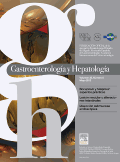
Gastroenterologia y Hepatologia
Advancing knowledge in gastrointestinal and liver health.Gastroenterologia y Hepatologia, published by Elsevier España SLU, is a distinguished journal dedicated to advancing the fields of gastroenterology and hepatology. With a publication history spanning from 1982 to 2024, this journal is recognized for its commitment to disseminating high-quality research and reviews that address critical developments in the diagnosis and treatment of gastrointestinal and liver diseases. Although it currently ranks in the Q3 quartile in both gastroenterology and hepatology based on the 2023 metrics, the journal continues to attract a global audience of researchers, healthcare professionals, and students eager to engage with the latest findings. The journal is accessible in both print and electronic formats (ISSN: 0210-5705), making its valuable insights reachable to a broad spectrum of subscribers. By fostering a platform for rigorous scholarly communication, Gastroenterologia y Hepatologia plays a vital role in shaping the future of research in these essential medical fields.
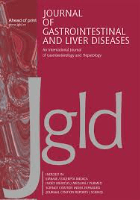
Journal of Gastrointestinal and Liver Diseases
Advancing Knowledge in Gastrointestinal and Liver HealthThe Journal of Gastrointestinal and Liver Diseases, published by MEDICAL UNIV PRESS in Romania, serves as a pivotal platform for the dissemination of significant research in the fields of gastroenterology and hepatology. Established in 2006, this journal has evolved over the years, currently holding a Q3 rank in Gastroenterology and a Q2 rank in Medicine (miscellaneous), reflecting its commitment to high-quality scholarship and impactful contributions to medical science.
With an ISSN of 1841-8724 and an E-ISSN of 1842-1121, the journal engages a diverse readership of researchers, clinicians, and students passionate about advancing knowledge in gastrointestinal and liver health. While it currently does not operate under an open access model, the journal remains a vital resource for those seeking to stay updated on the latest developments and emerging trends in the field. As it converges towards a broader impact, projected through its coverage until 2024, the Journal of Gastrointestinal and Liver Diseases continues to contribute to the academic landscape, encouraging innovation and comprehensive understanding in digestive health.
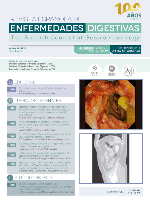
REVISTA ESPANOLA DE ENFERMEDADES DIGESTIVAS
Connecting researchers and clinicians for better outcomes.REVISTA ESPANOLA DE ENFERMEDADES DIGESTIVAS, a pivotal Open Access journal published by ARAN EDICIONES, S A, has been at the forefront of advancing the field of gastroenterology since its inception in 1990. With a robust commitment to disseminating high-quality research, the journal provides a platform for researchers, clinicians, and students to share innovative findings and insights concerning digestive diseases. The journal is characterized by its Q3 ranking in both Gastroenterology and Miscellaneous Medicine categories, indicative of its significant contributions to these fields, and is positioned within the 36th percentile of Scopus rankings for medicine related to gastroenterology. Based in Spain, REVISTA ESPANOLA DE ENFERMEDADES DIGESTIVAS has embraced the Open Access model since 2004, ensuring that its articles are readily available to a global audience without financial barriers. The journal not only supports academic discourse but also plays a crucial role in improving clinical practices and health outcomes related to digestive health.

JGH Open
Connecting Researchers, Transforming OutcomesJGH Open is a prominent open-access journal dedicated to advancing knowledge in the fields of Gastroenterology and Hepatology, published by WILEY. Since its inception in 2017, the journal has served as a crucial platform for researchers, professionals, and students to disseminate innovative research findings and clinical insights. With an impact factor and Scopus rankings reflecting its steady growth—ranking in the 3rd quartile for both Gastroenterology (Q3) and Hepatology (Q3)—JGH Open is positioned within the competitive landscape of medicine. Its commitment to open access enhances the visibility and accessibility of high-quality research, ensuring that significant advancements in understanding diseases of the gastrointestinal tract and liver reach a broad audience. With a focus on collaboration and dissemination of knowledge, JGH Open aims to contribute to the global discourse and improve outcomes in gastrointestinal health.

Korean Journal of Gastroenterology
Uniting Experts for Enhanced Digestive Health SolutionsKorean Journal of Gastroenterology (ISSN: 1598-9992, E-ISSN: 2233-6869), published by the Korean Society of Gastroenterology, has been a premier outlet for research and advancements in the field of gastroenterology since its inception in 1968. This open-access journal, based in South Korea, fosters a global dialogue on gastrointestinal health, embracing contributions from a diverse array of disciplines within medicine. It is currently ranked in the Q4 quartile for miscellaneous medicine and holds a Scopus rank of #323 out of 636 in general medicine, reflecting its commitment to publishing impactful research despite its relatively recent establishment in high-impact metrics. With a continuous publication timeline extending through to 2024, the journal aims to enhance understanding of gastrointestinal disorders and promote innovative treatments, making it an essential resource for researchers, clinicians, and students alike who seek to stay abreast of the latest developments and clinical applications in gastroenterology.

Advances in Digestive Medicine
Advancing Knowledge for Better Digestive CareAdvances in Digestive Medicine is a premier scholarly journal dedicated to the evolving field of gastrointestinal health and diseases. Published by WILEY, this journal aims to disseminate high-quality research encompassing a wide range of topics related to digestive medicine, from foundational studies to innovative clinical applications. As a significant resource for researchers, professionals, and students alike, Advances in Digestive Medicine fosters a deeper understanding of digestive disorders, promoting collaboration and knowledge exchange within the scientific community. Although it offers subscription-based access, the journal ensures comprehensive coverage of groundbreaking studies that significantly impact clinical practice and patient care in the field. With an ISSN of 2351-9797 and an E-ISSN of 2351-9800, it stands as an essential platform for anyone involved in digestive health research.

Journal of Digestive Diseases
Pioneering Discoveries in Digestive HealthThe Journal of Digestive Diseases, published by WILEY, is a premier scholarly platform dedicated to advancing research and dissemination in the field of gastroenterology. With an ISSN of 1751-2972 and an E-ISSN of 1751-2980, this journal has gained notable recognition, achieving a Q2 ranking in the gastroenterology category (2023) and positioning itself in the top 30% of Scopus-ranked journals, with a rank of #49/167. Our objective is to foster a comprehensive understanding of digestive diseases through high-quality research articles, reviews, and case studies that contribute significantly to clinical practice and policy-making. Although not open access, the journal ensures broad accessibility and visibility within the academic community, catering to researchers, professionals, and students alike. As it converges from 2007 to the present, the Journal of Digestive Diseases remains a vital resource for exploring cutting-edge developments and innovative solutions in gastrointestinal health.
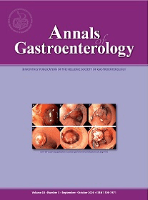
Annals of Gastroenterology
Fostering Excellence in Gastroenterological StudiesAnnals of Gastroenterology, published by the Hellenic Society of Gastroenterology, serves as a pivotal platform for advancing the field of gastroenterology, highlighting research that spans across the spectrum of gastrointestinal diseases and treatments. With an ISSN of 1108-7471 and E-ISSN of 1792-7463, this journal has established itself as a reputable source of scholarship since its inception in 2000, converging valuable insights through to 2024. Ranking within Q2 of its category and achieving a respectable 78th position out of 167 in the Scopus rankings, the journal holds a strong presence in the academic community, appealing to researchers, clinicians, and students alike. Although not an open access publication, Annals of Gastroenterology is dedicated to disseminating high-quality research that aids in the understanding and treatment of gastrointestinal conditions, making it an essential reference point for those engaged in this dynamic field.
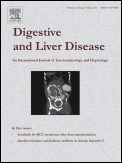
DIGESTIVE AND LIVER DISEASE
Unlocking the complexities of digestive and liver diseases.DIGESTIVE AND LIVER DISEASE is a prominent journal published by Elsevier Science Inc, dedicated to advancing the field of gastroenterology and hepatology. With an ISSN of 1590-8658 and an E-ISSN of 1878-3562, this journal has established itself as a significant resource within the academic community, especially considering its Q2 ranking in both gastroenterology and hepatology categories as of 2023. Spanning from 2000 to 2024, the journal presents a diverse array of peer-reviewed articles, clinical studies, and review papers that explore the latest advancements and research findings in digestive and liver diseases. The journal's robust impact, reflected in its Scopus rankings—40th out of 167 in gastroenterology and 28th out of 82 in hepatology—highlights its critical role in shaping practices and understanding in these vital areas of medicine. With open access options available, DIGESTIVE AND LIVER DISEASE aims to make high-quality research accessible to a wider audience, thereby encouraging collaboration and innovation. Researchers, healthcare professionals, and students alike will find valuable insights into the complex mechanisms, diagnostics, and therapeutic strategies pertinent to digestive and liver health.

DIGESTIVE SURGERY
Transforming Patient Care with Surgical InnovationsDIGESTIVE SURGERY, published by KARGER in Switzerland, is a leading journal at the forefront of its field, focusing on innovative surgical techniques and advancements in gastrointestinal surgery. With an ISSN of 0253-4886 and an E-ISSN of 1421-9883, this esteemed journal has been disseminating critical research since its inception in 1984, and is set to continue shaping the discipline until 2024. DIGESTIVE SURGERY holds an impressive impact factor, reflected in its 2023 ranking, positioned in the Q2 quartile for Gastroenterology and Q1 for Surgery. It is recognized within the Scopus database as #93 out of 551 in Surgery and #61 out of 167 in Gastroenterology, placing it in the top percentiles of both fields. While the journal is not open access, it remains a pivotal resource for practitioners, researchers, and students seeking to deepen their understanding of surgical practices and innovations that enhance patient care.